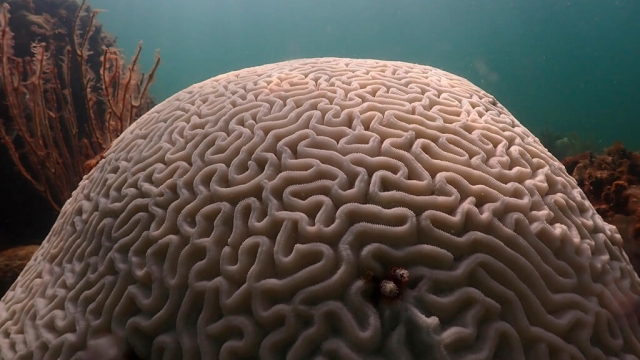Sea surface temperatures off the coast of Florida have reached extremes that, if verified, could be the hottest ever recorded in the world's oceans.
On Monday a sensor buoy at Manatee Bay, south of Miami, briefly registered a water temperature of 101.1 degrees Fahrenheit. On Tuesday, a second reading came in at 100.2 degrees.
The reading is higher than the previous global high of 99.7 degrees, recorded off Kuwait in July of 2020.
Meteorologists will have to make sure the readings meet certain conditions before they're considered fully valid. There are also no official records kept of sea surface temperatures.
But their effects are becoming quickly apparent. The ocean temperatures around Florida's coasts, which this year have reached roughly that of a consumer hot tub, have caused widespread bleaching and mortality in state coral reefs, according to some reports, even where corals had previously shown themselves relatively resilient to changing ocean conditions.
SEE MORE: NOAA model shows record marine heat waves — and predicts more
Terry Tamminen is president and CEO of AltaSea at the Port of Los Angeles, a scientific nonprofit that focuses on the oceans. He spoke with Scripps News about Florida's extreme temperatures, and the implications for corals, global climate and society going forward.
"The ocean regulates our climate. It covers two thirds of our planet. It's essential to our healthy survival on Earth," Tamminen said. "If we want a sustainable planet that can support ten billion people by 2050, it's going to be based on a healthy ocean — and right now we do not have that."
Corals like those in Florida represent a vital nursery for sea life that sustains entire ocean food chains and ecosystems, Tamminen says. And he says that changes in ocean temperatures could affect more than just the reefs.
"The Gulf Stream, for example, that goes from south to north, there's evidence that melting sea ice and so forth in the north could cause that to slow down," Tamminen said. "That could completely change our temperatures and our ecosystems and our weather. All of these things are interconnected. You can't take one small piece, like let's say, coral, out and expect the rest to survive."
SEE MORE: Monday was officially the hottest summer day ever
Tamminen points out that extreme weather and its effects are part of that interconnected system, which is changing faster than first predicted.
"What we've discovered in the last 20 years is that all of the predictions have come true on the high side. Things have happened sooner than we expected, and more intense than expected," Tamminen said.
"If past is prologue, we need to be concerned about what the science is telling us today," Tamminen said. "We should be looking at the extremes and preparing for those extremes, whether it's more intense storms, sea level rise, wildfires, droughts and the other problems that's going to cause."
Trending stories at Scrippsnews.com



